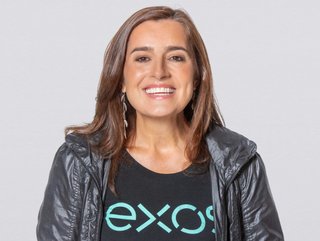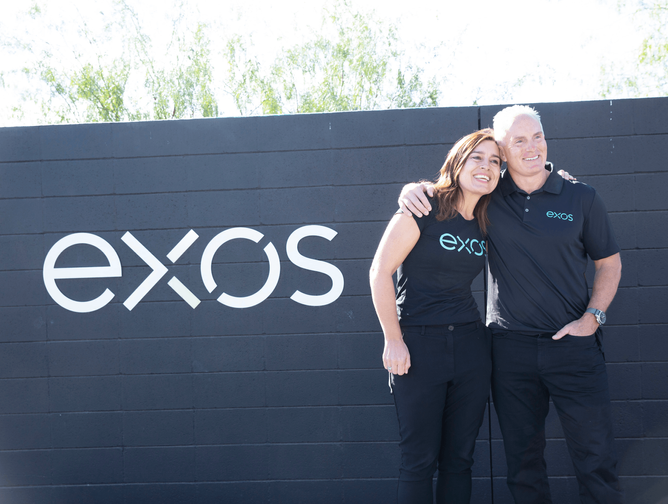Five Minutes With: Sarah Robb O'Hagan, CEO at Exos

Sarah Robb O’Hagan has always been driven by a desire to challenge herself, explore new opportunities and push boundaries.
Having grown up in New Zealand, Robb O’Hagan moved to the US in her 20s and landed a “dream job” at Nike where she stayed for more than five years, gaining valuable experience in creative leadership and innovation.
From there, Robb O’Hagan went on to become Global President at Gatorade, where she and her team led a complete brand and product transformation, turning the business around.
She was subsequently recruited as President of Equinox, and later as CEO at Flywheel, before taking on her current role as CEO at Exos.
“It took me a while to realise the work I was doing needed to align not only with my passions in life, but also that I needed to work with people and teams that shared that same approach,” says Robb O’Hagan.
“Once I did, that’s when I found great fulfilment in my leadership.”
Here, Business Chief sits down with this inspiring leader to discuss how Exos is shaping a healthier workplace of the future.
For those unfamiliar with Exos, what are the company's core activities?
Exos is a coaching company. We have several thousand coaches around the world who work with everyone from elite athletes and military leaders to everyday corporate executives like you and me.
We provide coaching to enable them to optimise their performance against the goals they have set for themselves and their teams. We partner with about 30% of the Fortune 100 as clients, and we serve more than 300,000 people on any given month in hundreds of facilities across dozens of countries around the world.
In the four years since the COVID-19 pandemic, the workplace and workforce have gone through a transformation that has altered the way we work, live and the balance between the two. We have seen that the traditional “grind” approach to work has led to massive burnout rates and an ever-growing mental health crisis. Return-to-office mandates and chronic stress for many employees have created trends like quiet quitting and decreased performance.
With all of this as a backdrop, we realised at Exos that we had a really important role to play in helping to shape a healthier workplace of the future.
Since our company was founded, we have believed in the mantra that work + rest = success. So, we took what comes naturally to us, and codified this in a more accessible way to help our clients combat the burnout crisis.
We call it the Readiness Culture Code (RCC), a first-of-its-kind blueprint to reimagine corporate culture and equip employees with the physical, mental and emotional capacity to meet the demands of modern work.
In tandem with the launch of the RCC, we actually implemented a four-day working week for our 3,500 employees to spend Fridays intentionally recovering, however works for them, to gauge the impact of implementing the RCC and assess how reducing work days affects wellbeing and performance.
How closely connected are physical health and work performance?
The mind-body connection is very real, so how our body feels directly correlates to how our mind feels at work and beyond.
Think about your own experience. If you are experiencing neck or back pain from sitting in your chair for hours on end, that can impact how you sleep at night, which can impact your mental disposition, which can lead to not maintaining great habits like good nutrition and exercise.
We see this kind of example play out in every context of coaching humans. From our historical work training athletes like NFL prospects, military veterans and our most recent work bringing physical fitness into NYC public schools, Exos has had a front-row seat in seeing the positive effects of nourishing both your physical and mental health and how that translates to the workplace. In corporate America, the parallel to an athlete overtraining for an important competition or physical event is an employee burning out.
What specific improvements can employees expect to see as a result of improving their health?
Instead of focusing on what to take off someone’s plate to reduce stress, we believe the main focus should be building employee capacity to handle what’s actually on their plates. That was the overall intent of our RCC, which we rolled out to our own employees in 2023.
We’ve seen incredible impacts on our own employees' health and wellbeing; everything from reduced feelings of burnout and improved feelings of joy at work, to better sleep because employees are not awake at night worrying about work issues from the day.
How does Exos ensure its own employees stay in good physical health?
For years, corporate culture has been focused on working harder, raising the intensity and buying into the hustle to get results. We’re changing the future of the industry by recentering on recovery as a major key to peak performance.
Both in elite athletics and within the workplace, recovery techniques are a foundational element of our methodology. This includes simple approaches such as ensuring meetings finish 10 minutes before the hour to give employees time to stretch and move, and more formalised breathwork sessions to help employees downregulate at the end of a heavy meeting day, before returning to their home life.
As part of our Readiness Culture Code guidelines, we also encourage employees to move throughout the day. Instead of your traditional call with internal partners, we opt for a “walk and talk” to get the job done.
Our workforce also has access to our suite of resources to aid them in their physical health. With Exos Fit, Exos employees can take part in virtual or in-person coaching, live-streamed and on-demand fitness classes, and wellness practices from Exos coaches to explore mind, body and nutrition training, and group health and wellness challenges for shared victories, camaraderie and motivation.

What steps would you recommend leaders take to help employees improve their physical health?
Businesses can help employees shift their mindset and embrace a culture of recovery by throwing burnout culture out the window and rethinking how wellbeing is related to work.
This doesn’t mean we’re suggesting employees don’t work hard and push themselves to get the job done; it just means wellness should be woven into work, rather than thinking of work and recovery as being at odds with each other.
One easy example is to set clear boundaries at work, whether it’s adding your time zones to your email signature or taking a mini recharge break after a meeting to re-focus. Another could be as simple as working ‘fitness breaks’ into your day-to-day just to get your body moving. This is woven into our Readiness Culture Code, and it’s just a few of the ways we help our teams prioritise recovery.
What advice would you give to employees who find it hard to prioritise exercise?
I’d start by saying that, even for those most committed to fitness and exercise, it can be hard to prioritise when it feels like there is too much on your plate. But, it starts with that old saying, “put your own oxygen mask on first, before tending to others around you”.
The fact is, if you don’t prioritise your own physical wellbeing, you’ll end up making work even harder for yourself, as the demands stack up and your strength and focus dwindle.
So, always remind yourself that exercise doesn’t need to require extra time; it can be woven into your day that already exists. For example, if you’re having a one-to-one meeting with someone, that is an opportunity to go for a walk and talk and get some fresh air, instead of sitting in a meeting room or in your home office.
Another option for remote workers is to schedule exercise time during your day instead of before your day starts. Even just half an hour of moving your body during the workday has a surprisingly positive impact on your ability to concentrate on focused tasks if you time it before a period of focused thinking work.
Generally speaking, do you feel companies are placing enough emphasis on the importance of maintaining good physical health?
To be honest, I think we have a long way to go for companies to truly understand the reasons to prioritise good physical health.
For many years, the focus on physical health has been with the goal of reducing healthcare costs to improve the bottom line. However, in my view, that is an outdated framing of the opportunity.
In actual fact, better overall wellbeing for employees can be a driver of greater productivity, greater loyalty and retention of top talent, and therefore better results for the company. Who wouldn’t want that?
Yet, I constantly find myself in conversations with C-Suite leaders who hear our research-backed insights about movement and recovery, but they have a tough time hearing me because they equate this idea of more recovery to their workforce being less productive or doing less.
We badly need to change this conversation for the good of employees, as well as the longevity and success of the companies they work for.
******
Check out the latest edition of Business Chief Middle East & Africa.
******
Business Chief is a BizClik brand.
- Liz Elting – Driving Equality & Building Billion-$ BusinessLeadership & Strategy
- 6 leadership principles for transitioning into an ESG worldSustainability
- Five Minutes With: Kelly Ahuja, CEO at Versa NetworksLeadership & Strategy
- Have senior leaders lost sight of what motivates employees?Leadership & Strategy






